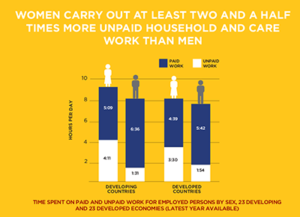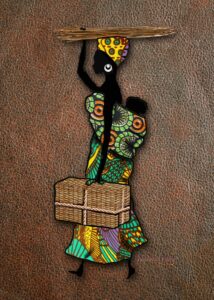Happiness is Free; but work isn’t
The month of May comes with a significant day for women around the world. Mother’s Day, though not a formal holiday, is celebrated across the world following the USA calendar which falls on every second Sunday in May every year.
With widespread use of social media, people get the opportunity to post lovely “Happy Mother’s Day” messages for their mothers, wives, sisters, aunts, daughters, friends and all other women on their timelines. Virtual spaces indeed, get awash with messages of love and happiness.
But: is motherhood and all work that comes with it something that brings happiness to most women?
Household labour, ranging from cooking and cleaning, fetching water and firewood or taking care of children and the elderly falls heavily on women. Studies have shown that, women carry out at least two and a half times more unpaid household and care work than men.
Women’s unpaid work subsidizes the cost of care that sustains families, supports economies and often fills in for the lack of social services.
Yet, it is rarely recognized as “work “.
Unpaid care and domestic work is valued to be between 10 and 39% of GDP and can contribute more to the economy than the manufacturing, commerce or transportation sectors. But unpaid labour rarely receives any recognition.

The ILO found that, if care work was valued the same as other work, it would represent a tenth of the world’s economic output.
Covid-19 pandemic and increasing effects of climate change has further increased time spent by both men and women on care work, but the increase of this work has been far greater for women.
Spending more time on unpaid care means having less time for paid labour, political participation, self-care, rest and leisure. For girls especially in poorer communities/countries, it also means missing school hours or not being in school at all.
Unpaid care work has also been observed to stunt girls’ self-confidence and personal development through play and socialization.
Women’s rights advocates around the world are pushing for the recognition of unpaid care and domestic work. They want to raise visibility on the issue and provide the time and resources for men and women to share household tasks.
Other ways that could make a difference include: counting unpaid care work in statistics, acknowledging its place in the economy, compensating women for their contributions, and considering unpaid care work when making policy decisions.
In the coming times, the world should gift mothers and women a happier day by making sure that their time and efforts spent providing care, counts and fully compensated.
No one should keep cheering on free labour and expecting those providing it to be happy.

